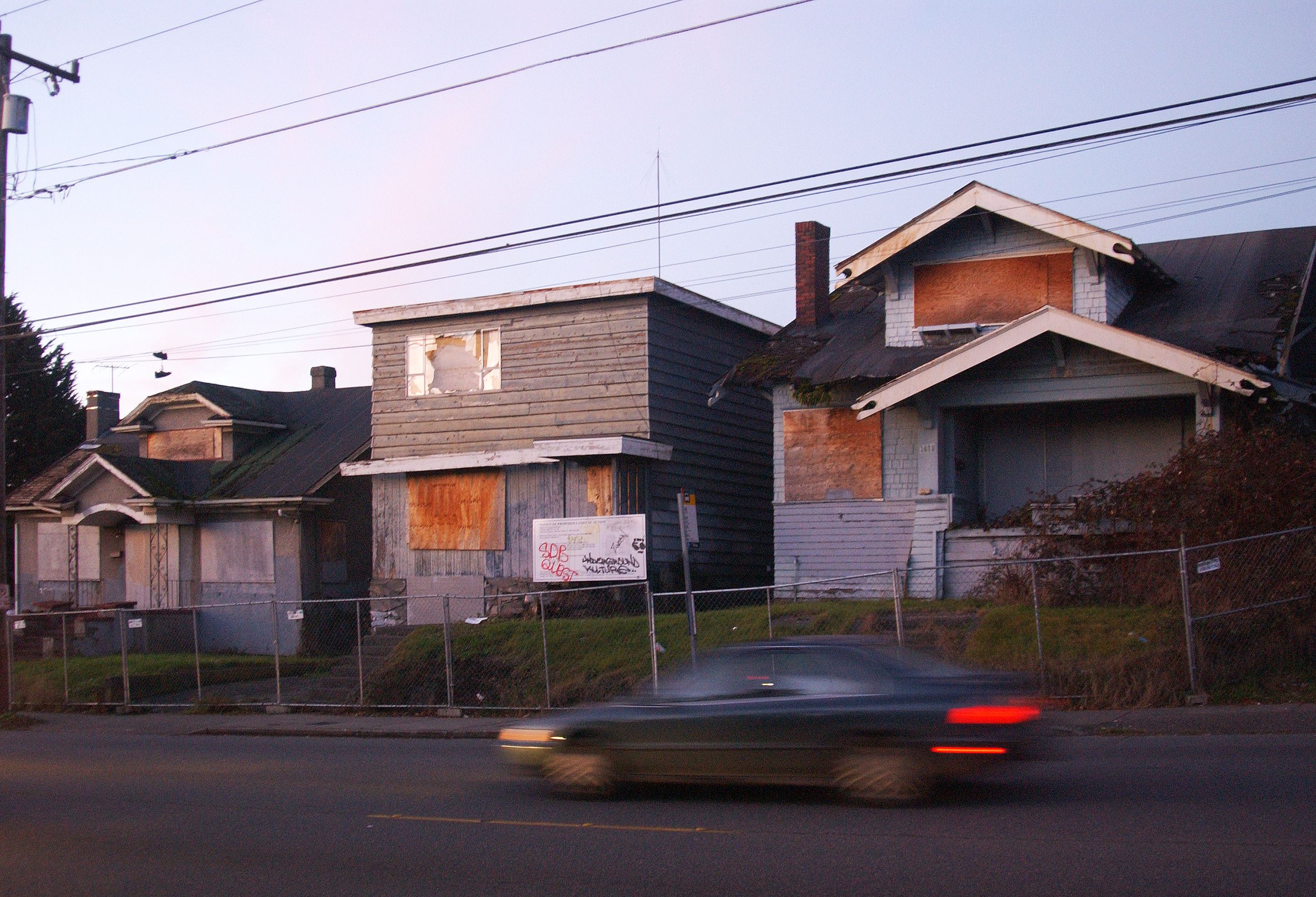Neighbors were enlisted. Signs were made. Cameras and reporters were notified. And on Friday morning City Hall’s finest took to a sidewalk in Roosevelt for an open-air press conference to announce some important news: Nothing’s changed.
Not that you could have concluded that from the press conference or the cheering crowd and the ensuing news coverage of the city’s latest attempt to crack down on 88-year-old Hugh Sisley, Seattle’s most resilient slumlord.
“Today we are announcing our plan to take what has been nothing short of a black eye on this neighborhood and turn it into something that the entire community can enjoy,” Mayor Ed Murray said, addressing the crowd next to a row of boarded-up Sisley properties. He gave the impression that if Sisley didn’t pay $3 million in fines, the properties would be seized and replaced by a park. City Attorney Pete Holmes hailed it as an “innovative solution” and council member Jean Godden declared “Today’s win” as “one for our neighborhood.”
The media followed the city’s lead; Roosevelt’s long dilapidation nightmare was over. KIRO-TV explained it as “In exchange for $3 million in fines on your blighted property, give us the park. Refuse, and we’ll take it by eminent domain.” The Seattle Times’ headline was “City pocket park may replace Roosevelt-area blight.” KING-TV called it “a plan to demolish buildings and create a public park in their place.” (That story also appeared on Reddit with a headline saying the city would bulldoze Sisley’s land and install a park). KOMO-TV said Murray and Holmes announced “the city has just been awarded a judgment of $3.3 million against property owners Hugh and Martha Sisley.”
None of that is true, says Sisley’s attorney Jeff Grant. The tiny park, should it evolve, will be on what is already vacant land. That nearby slum row is not part of the park plan, and Sisley is working with a private company on redevelopment there. There was no recent judgment of $3.3 million. As we reported last year, that’s the record-setting total in fines and interest built up over what has been more than 35 years of hand-to-hand combat with Sisley, who is trying to whittle down his bill in talks with the city.
“Those headlines, some reporting, were incorrect,” says Grant. “Nobody’s talking about wholesale demolition of Mr. Sisley’s properties.” Actually, officials were talking about a park plan that could end up costing the city money. The council this week will consider legislation to create the .02-acre park on 14th Avenue Northeast at Northeast 65th Street. They’d like Sisley to deed over the property, allowing him to subtract the fair-market value from his tab. If he refuses, the city would legally seize the property and sell it, then buy it, at a sheriff’s auction. (If outbid, the city says it would seize the land from the buyer through eminent domain, paying fair market value).
Though the city and Sisley have been moving towards settlement of the $3 million debt, Grant says, he didn’t learn of the press conference until a reporter called him the day before. “A thing like this, it doesn’t help, I can tell you that,” he says. “Five high-level city officials, all publicly elected, call a press conference that seems intended only to bash somebody.”
Of course, Sisley, owner of four dozen Roosevelt homes and lots, is a notorious foot-dragger, amassing close to 200 code-enforcement cases dating to the 1980s, according to city records. They include violations for faulty wiring, unsafe conditions, insect infestation, junk storage, emergency situations, and unfit vacant buildings subject to demolition. Taken to court more than two dozen times to force his compliance, Sisley staves off payment of fines with lengthy legal appeals. His current fines are mostly the result of two cases he has been appealing for six years. But the appeals have all run their course, attorney Grant says.
In an editorial last week, the Times felt “The city is fed up and is not going to take it any more. … If a muscled-up approach can sweep away blight, Godspeed.” But officials have yet to show they’ve found a Sisley solution, and what that press conference amounted to was a victory declaration in the midst of battle.
“The press conference might have made sense if our latest deadline had come and gone,” says Grant. “But it hasn’t. There’s no mystery that things have been contentious,” he says of the negotiations. “We’re trying to work a deal in connection with the development going on there. We’ll continue to meet and talk, and try not to let hard feelings get in the way.”
And if the talks fail? “If the whole thing collapsed, if everyone digs in and the properties end up going through judicial foreclosure?” says Grant. “Well, that could take many more years.”
randerson@seattleweekly.com
Rick Anderson writes about sex, crime, money, and politics, which tend to be the same thing. His latest book is Floating Feet: Irregular dispatches from the Emerald City.








